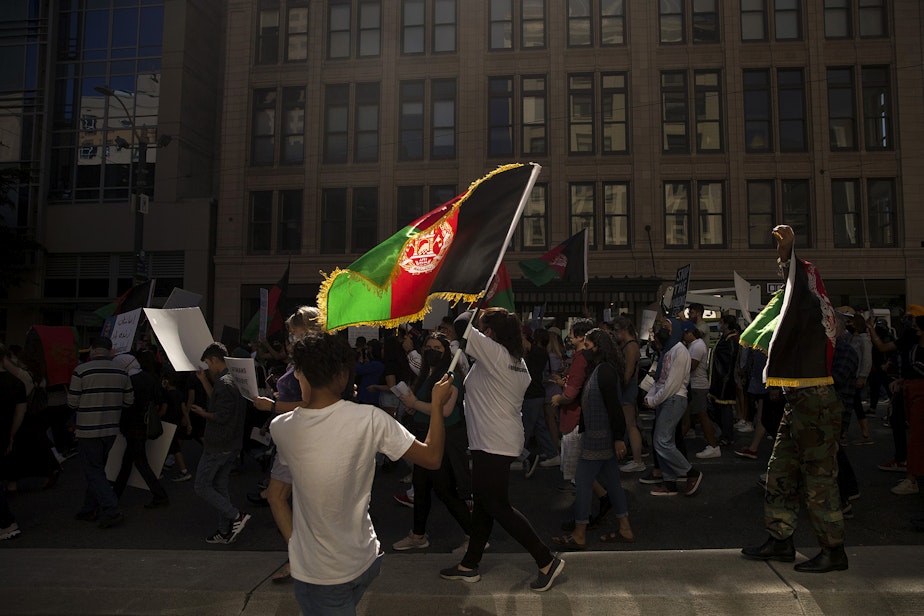A year after Kabul's fall, Afghan families fear for loved ones left behind

Dinner is more than nourishment — it’s a way to connect, to celebrate, and offer thanks.
On a recent evening in SeaTac, Afghan families gathered to thank all those who helped them escape during the U.S. withdrawal from Afghanistan. They were also marking the one-year anniversary of that traumatic moment.
Dinner guests filled their plates with chicken kebab, rice palau, mantu dumplings, and other Afghan dishes. The dinner was organized by local community groups. It was a reunion of sorts for military vets, elected officials, and volunteers involved in the resettlement effort.
“You have my mentor, that’s our boss, our big boss,” Yusuf said, beaming as he pointed to his former colleagues at his table. “I used to work as a linguist with them.”
Yusuf, who asked to only be identified by his first name and country of origin due to safety concerns, has been in the Puget Sound area for less than a month. He’s been living in a hotel and hopes to move into his own place soon.
His mentor is a special forces officer.
This is the first time Yusuf and his mentor, who is a special forces officer, have reconnected since Yusuf moved here.
“We’re already making plans; I want to show him around town,” said Yusuf's mentor, who agreed to speak to KUOW on the condition that he wouldn't be identified, citing concerns of Taliban reprisals on other Afghans.
But it’s a bittersweet moment.
Underneath the joy, there’s a level of restlessness. Yusuf’s wife and young children are still in Afghanistan.
“I’m starting a new life here, but I won’t have a good start until I get my family back," he said. "So I’m working on that, along with my friends here. And I hope someday we will get reunited.”
For years, Yusuf worked with the U.S. Special Forces in Afghanistan as a translator and cultural advisor. When Kabul fell, the Taliban started searching for people like Yusuf and his family, who had worked with the Americans.
Yusuf’s mentor had already left Afghanistan the year before, but was working with the organization Operation North Star that formed to help Afghan allies and their families.
“The Taliban were executing these people and having extra judicial trials on the streets. So we had to do what we could to find ways to get him the resources so that they could get out of town.”
Yusuf’s mentor kept track from afar as Yusuf and his family fled north, spending months in hiding as they went.
“We were supposed to be evacuated altogether,” Yusuf said.
But that changed, and Yusuf had to make a tough decision, his mentor said.
“His brother was very sick and needed a medical evacuation. So we were able to prioritize them in the evacuation list.”
Yusuf’s brother suffers from severe ulcerative colitis. Yusuf and his brother were evacuated to Abu Dhabi, where they hoped Yusuf’s wife and children would be able to join them.
“But unfortunately something happened and they never got out.”
After nine months in a refugee camp, Yusuf was able to enter the U.S. with a Special Immigrant Visa. But his brother did not get one.
Between October 2021 and February 2022, Washington welcomed more than 3,000 refugees, under the federal program Operation Allies Welcome.
As time passes, Yusuf’s mentor said he worries the public will forget the many Afghans who remain stranded.
“It’s a humanitarian crisis that we need to pay attention to. And we owe them — the people that fought by the side of our service members, kept American diplomats and American [non-government organizations] safe as they were operating in Afghanistan.”
As the community dinner slowly wound down, Yusuf said he's grateful for the chance to start a new life here. He chose Seattle because he has a network of support from friends and former colleagues in the area. But he’s anxious for his wife and children to join him.
“Each hour, I text them and receive updates whether they’re fine or no. Because their situation is tough there.”




